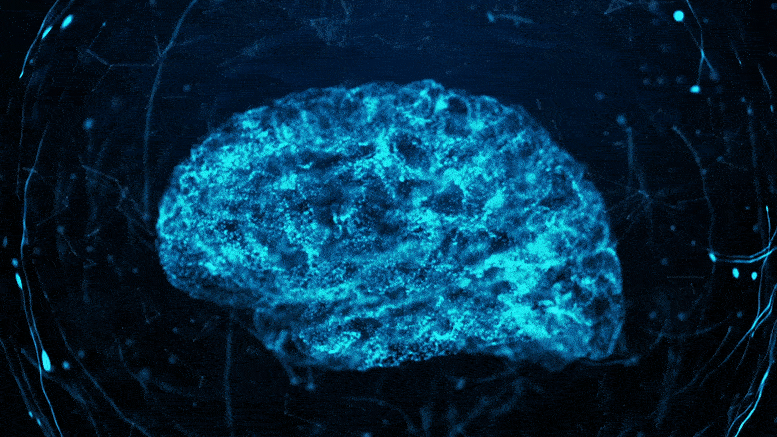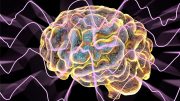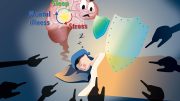
A UCLA-led team of scientists reports on why sleep is vital to our health and how the brain heals during sleep.
In very early life, sleep helps build the brain’s infrastructure, but it then takes on an entirely new decluttering role.
Prolonged sleep deprivation can lead to severe health problems in humans and other animals. But why is sleep so vital to our health? A UCLA-led team of scientists has answered this question and shown for the first time that a dramatic change in the purpose of sleep occurs at the age of about 2-and-a-half.
Before that age, the brain grows very rapidly. During REM sleep, when vivid dreams occur, the young brain is busy building and strengthening synapses — the structures that connect neurons to one another and allow them to communicate.
“Don’t wake babies up during REM sleep — important work is being done in their brains as they sleep,” said senior study author Gina Poe, a UCLA professor of integrative biology and physiology who has conducted sleep research for more than 30 years.
After 2-and-a-half years, however, sleep’s primary purpose switches from brain-building to brain maintenance and repair, a role it maintains for the rest of our lives, the scientists report on September 18, 2020, in the journal Science Advances. This transition, the researchers say, corresponds to changes in brain development.
All animals naturally experience a certain amount of neurological damage during waking hours, and the resulting debris, including damaged genes and proteins within neurons, can build up and cause brain disease. Sleep helps repair this damage and clear the debris — essentially decluttering the brain and taking out the trash that can lead to serious illness.
Nearly all of this brain repair occurs during sleep, according to senior author Van Savage, a UCLA professor of ecology and evolutionary biology and of computational medicine, and his colleagues.
“I was shocked how huge a change this is over a short period of time, and that this switch occurs when we’re so young,” Savage said. “It’s a transition that is analogous to when water freezes to ice.”
The research team, which included scientists with expertise in neuroscience, biology, mathematics and statistics, conducted the most comprehensive statistical analysis of sleep to date, using data from more than 60 sleep studies involving humans and other mammals. They examined data on sleep throughout development — including total sleep time, REM sleep time, brain size and body size — and built and tested a mathematical model to explain how sleep changes with brain and body size.
The data were remarkably consistent: All species experienced a dramatic decline in REM sleep when they reached the human developmental equivalent of about 2-and-half years of age. The fraction of time spent in REM sleep before and after that point was roughly the same, whether the researchers studied rabbits, rats, pigs or humans.
REM sleep decreases with the growth in brain size throughout development, the scientists found. While newborns spend about 50% of their sleep time in REM sleep, that falls to about 25% by the age of 10 and continues to decrease with age. Adults older than 50 spend approximately 15% of their time asleep in REM. The significant dropoff in REM sleep at about 2-and-a-half happens just as the major change in the function of sleep occurs, Poe said.
“Sleep is as important as food,” Poe said. “And it’s miraculous how well sleep matches the needs of our nervous system. From jellyfish to birds to whales, everyone sleeps. While we sleep, our brains are not resting.”
A chronic lack of sleep likely contributes to long-term health problems such as dementia and other cognitive disorders, diabetes, and obesity, to name a few, Poe said. When you start to feel tired, she said, don’t fight it — go to bed.
“I fought sleep and pulled all-nighters when I was in college, and now think that was a mistake,” Savage said. “I would have been better off with a good night’s sleep. Now when I feel tired, I don’t have any guilt about sleeping.”
For most adults, a regular seven-and-a-half hours of sleep a night is normal — and time lying awake doesn’t count, Poe says. While children need more sleep, babies need much more, roughly twice as much as adults. The large percentage of REM sleep in babies is in stark contrast to the amount of REM sleep observed in adult mammals across an enormous range of brain sizes and body sizes. Adult humans have five REM cycles during a full night of sleep and can have a few dreams in each cycle.
A good night’s sleep is excellent medicine, Poe says. And it’s free.
Reference: “Unraveling Why We Sleep: Quantitative Analysis Reveals Abrupt Transition from Neural Reorganization to Repair in Early Development” by Junyu Cao, Alexander B. Herman, Geoffrey B. West, Gina Poe and Van M. Savage, 18 September 2020, Science Advances.
DOI: 10.1126/sciadv.aba0398
BioRxiv
Co-authors of the study are Junyu Cao, who conducted research in Savage’s laboratory and is now an assistant professor at the University of Texas at Austin; Alexander Herman, an assistant professor of psychiatry at the University of Minnesota, Twin Cities; and Geoffrey West, a physicist who is the Shannan Distinguished Professor at the Santa Fe Institute.
Funding sources included the National Science Foundation and the Eugene and Clare Thaw Charitable Trust.







Don’t be admired if most of the world population will suffer dementia at their later stages of life. The kind of life we are doing will bite us back a few years from now, mark these words. We already have the tools to fix our problems, now use them.
Yet some of the greatest minds and brilliant people of the world have said they get by on very little sleep. I wish the writer would comment on that
I wonder how giraffes lack of sleep play in to this or well documented yogis that rely on very little sleep instead using meditation, and even genius’ like Tesla who hacked their sleep cycles. I’ve also read that Buddha only slept one hour a day. What do the exceptions to the rule tell us about sleep?
Link in this article references bioRxiv – The correct link to published manuscript in Scientific Advances is https://advances.sciencemag.org/content/6/3 8/eaba0398 // DOI: 10.1126/sciadv.aba0398
Does not apply to me though. I sleep every 48 or 72 hours and I’m well and good 🙂
That’s what I did when I was in my thirties, worked 16 hour shifts seven days a week for almost a year, then I’d start bouncing off the walls because the door ways were too narrow, then I’d realize that I hadn’t eaten anything for the last few days either, so after work I’d get some sleep, and do it again; it was a blast for me anyway because I was living life rather than watching it on television.
It is true. The results are more expected. More intersting are brain development of brain during an early 2 and half years and its repair and maintenance later on. Great work, too much appreciated.
If due to sleep deprivation one goes from 9 hours a sleep to 5 hours, can this be reversed, if the sleep deprivation was caused by sound and noise interference?
Yet some of the most demented minds “claim” they don’t sleep…comment on that one too
So what about natural short-sleepers (real thing)?
Wish there had been some discussion about that and insomniacs…
Per yogis sciences?, 4-6 hers good and normal in healthy balanced well maintained human being.(Refer to living life master/ mystic Sadhguru Jaggi. Inner Engineering Program, Isha Foundation) 1/6-1/4 of the day used for this adequate.Unless health issues, eating lethargic negative pranic foods and/or living a lethargic, not relaxed or in balanced, lifestyle. 8 hers, 1/3 of day gone, too much in yogis culture. Or is anyone jugged in yogic (the mental and physical state of union) culture. Yogis culture is a beautiful incredibly blissful science if well being in every aspect of a human being’s life. Sadhguru at one point in his life slept 2 hers a night. Now he homes he’s lazy as it’s around 4hrs! It also can depend on how well a human being functions and treats the body and mind during the day.Providing deeper, sooner lasting sleep for body repair – and less 9f it if the body is already in an optimal state. Many who take the Inner Engineering program and continue with the 21 min. scientific practice, along with other wonderful health benefits, finds she or he wakes up naturally refreshed after four hours sleep. And sometimes?-often by 3-3:20 am. Going to bed at 10pm, a time the brain switches gears for sleep from the day. When T.V. and electronics should be off. The brain in rhythm with the earth, natural surroundings, switching gears from stimulation to no stimulants to work best internally for repair and refreshment. The yogis sciences have known such things about sleep and every aspect of the brain and body possible.
(Spell checked better here) Per yogis sciences, 4-6 hers good and normal in healthy balanced well maintained human being.(Refer to living life master/ mystic Sadhguru Jaggi. Inner Engineering Program, Isha Foundation) 1/6-1/4 of the day used for this adequate.Unless health issues, eating lethargic negative pranic foods and/or living a lethargic, not relaxed or in balanced, lifestyle. 8 hrs, 1/3 of day gone, too much in yogic culture. Or is anyone judgd in yogic (the mental and physical state of union) culture. Yogis culture is a beautiful incredibly blissful science of well being in every aspect of a human being’s life. Sadhguru at one point in his life slept 2 hers a night. Now he jokes he’s lazy as it’s around 4hrs! It also can depend on how well a human being functions and treats the body and mind during the day.Providing deeper, sooner lasting sleep for body repair – and less of it if the body is already in an optimal state.A matter of what you have done physically and how you’ve been emotionally /mentally and physiologically before sleep. Many who take the Inner Engineering program and continue with the 21 min. scientific meditation practice, along with other wonderful health benefits, finds she or he wakes up naturally refreshed after four hours sleep. And sometimes often by 3-3:20 am. Time when the brain is geared to wake at a quiet time to start the day. (More science behind this) Going to bed at 10pm, a time the brain switches gears for sleep from the day. When T.V. and electronics should be off. The brain in rhythm with the earth, natural surroundings, switching gears from stimulation to no stimulants to work best internally for repair and refreshment. The yogis sciences have known such things about sleep and every aspect of the brain and body possible. And how maximize sleep quality without requiring to many hours. Namaste.
As a Trauma/ER Doc who did many years on night shift, I experienced sleep deprivation as a way of life. Only after I converted to day shifts did I realize the many detrimental effects I had sustained. A very healthy “remedy” is day time napping which can be very refreshing. I’d like to know from the experts about evidence based findings on the “healing” thru these frequent and regular naps. Can they overcome the lack of overnight REM?
1. Beautiful research thank you. I’ve always been faster by the brain and it’s marvelous works behind the scenes. This sheads new light on a much broader topic.
2. This is for those who say people get by off very little sleep, it’s called napping. You can close your eyes and meditate all you want, but do you really believe that someone is sitting there and their eyes closed in a meditative state for all that time, they’re napping. End of story.
Very Interesting.
So what is it that we as a Human Species can do to increase the quality and experience of REM (Rapid Eye Movement) sleep, during the sleeping cycles.
Without a doubt the requirement of 50 plus hours of sleep during a week is essential for good health. However, if we brek the Sleep Cycle during a 24 Hour Period into smaller chunks of say 2 hours each, and wake upp completely refreshed, does the quantity and quality of REM sleep increase and aid in the development of Brain Structure Life Long instead of only doing the Childhood period and then doing maintenance work for the entire lifetime?
Another thought is the development of the brain in the mothers womb. This is from the moment of conception to birth— may be even more important that the development of the brain of the Child from birth to the age of two and half years.
An interesting area for exploration and research? What do you think?
Dear scientist now u know why we need to sleep? Hahahahha God has given brain to think but u r just started that y we need to sleep? Hahahaha
You all are still in B.C hahahaha
are you a koskhol man? common then.
My friend says after reading this – Fish oil is old man’s Viagra!
Koskhol-Ko.askhol man, patronising and iliterate, wich has roots in the way you were raised by your father.